In this sustainable brand founder Q&A series, we catch up with Rob Webbon, an environmental scientist and CEO of Presca sportswear.
We discuss the inspiration behind the brand, challenges the brand faces, eco-anxiety, and what he hopes the future looks like for the sportswear industry.
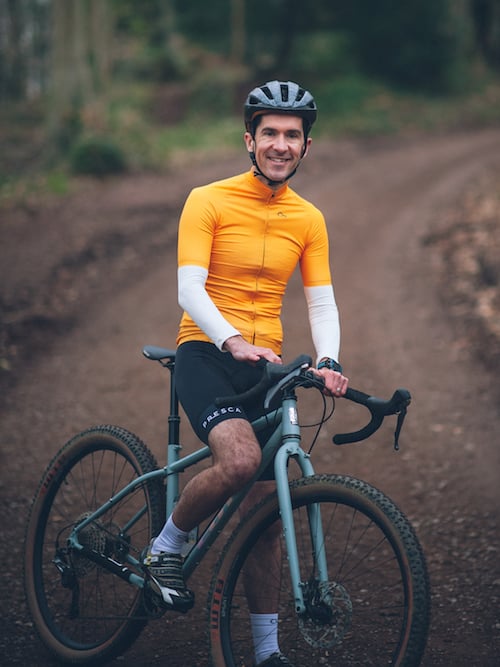
Hey, can you tell us who you are, what you do, which brand you run, and what products you create?
My name is Rob Webbon. I am the CEO and co-founder of Presca sportswear. We are a sportswear brand focusing on creating climate-positive, ethical clothing for cycling, running, and triathlons.
What was the inspiration behind Presca?
My background is as an environmental scientist – I studied two degrees in that area and then worked in consultancy and local government for 15 years. At the same time, I started getting into my sports, particularly endurance sports like iron-distance triathlon, ultrarunning, etc. So I was getting more and more into the gear associated with those sports, and I suppose that’s where my professional background collided with my passion.
I realised that the clothing I was wearing was far from optimal in terms of its impact on the environment, potentially in terms of its social impact as well, because there was very little transparency about the way it was made. So like any naive entrepreneur, my Co-founder Guy (who is also my racing buddy) and I decided we could do better, and we founded Presca.
What was the most interesting challenge you overcame while developing technical sportswear from responsible materials?
When we first started the company, sustainability wasn’t even a word in the mainstream vocabulary for sportswear.
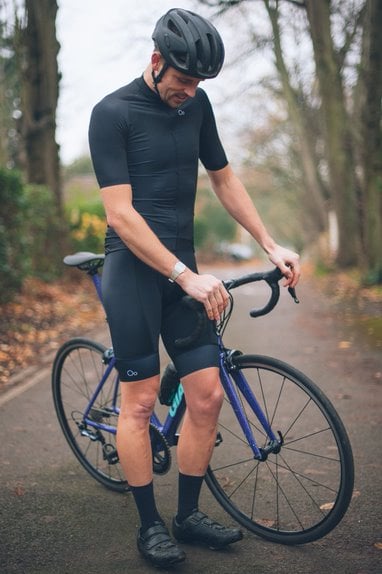
There was little understanding or interest in the environmental impact of sportswear, and the wider clothing industry and fibers and fabrics from more sustainable sources were really hard to get hold of.
When we first started the company, sustainability wasn’t even a word in the mainstream vocabulary for sportswear.
I remember back in the early days, we would be buying recycled yarns from Europe, shipping them to our fabric mill in Nottingham to get fabrics made to the specification we needed, and then arranging for them to go to another factory in the UK to be cut and sewn into clothing.
Fast forward a number of years, and every brand is now looking at using “sustainable” fabrics. It’s a great sign that consumers have woken up to the need to look after the environment. Still, it’s also a little frustrating to see so many companies jumping on the bandwagon when often their intentions are less than noble.
Can you share information about where your sportswear is produced and how / why you choose your suppliers?
Yep, we’re happy to talk to anyone about our supply chain – we already spell out where our suppliers are on our website and are looking at full transparency as the next step.
We manufacture through three factories in Lithuania, Portugal, and northern England, and all of our fabrics come from specialist performance fabric mills in Italy, Spain, and Portugal.
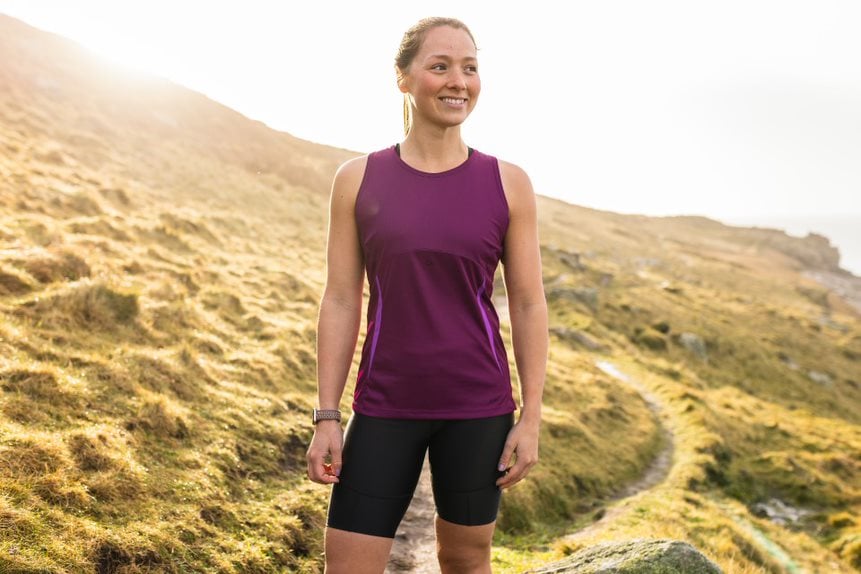
We’ve been working with most of these suppliers for many years now. Initially, we found them just through looking for companies that could do what we needed with the sustainable fabrics that we were choosing. In time, as we’ve grown as a company, our level of detail with regards to environmental and social requirements has increased, and happily, our suppliers have been able to more than meet our requirements.
When we’re looking for new suppliers, we have a strict code of conduct in line with fair wear foundation principles for the social elements of manufacture and the environmental side of things. We ask each of our mills to provide detailed information about their environmental management practices. Our supply chain approach is very much built on relationships and self-certification, and we rely on the European element as a good starting point for good environmental/social practice. But we are always looking for partners who are going over and above standard.
As we grow, we will need to make sure that our increasing number of suppliers are also meeting these standards, which will be through audits that we carry out ourselves and via third parties.
Greenwashing is a major problem in fashion and sportswear, with many customers being misled by brands. What are your thoughts on greenwashing, and do you think there should be more regulation around false sustainability claims?
Yep greenwashing is a major problem, and we see more and more of it every day. It’s incredible how many brands apparently have “sustainability in their DNA” when they never even talked about it a year or two ago.
Green claims legislation is coming down the line, and it will be interesting to see whether that has any teeth or not. Regardless of where that goes I do think more and more companies will be looking to use verifiable claims as consumers are becoming more and more switched on to greenwashing.
The challenge will be ensuring that companies who are genuinely trying to do better are not tarred by the same brush as companies who are found to be using spurious environmental claims to sell more cr*p products.
Can you tell us more about how you’re encouraging people to recycle their old sportswear in your sportswear recycling program?
We are designing clothing with the end in mind, so we’re using mono-material fibres wherever we can. We are thinking about how we can treat garments at the end of their lives – we’re partnering on three recycling trials for end-of-life clothing. And we have committed to take back any piece of clothing we’ve ever made to do the best with that product that we can.
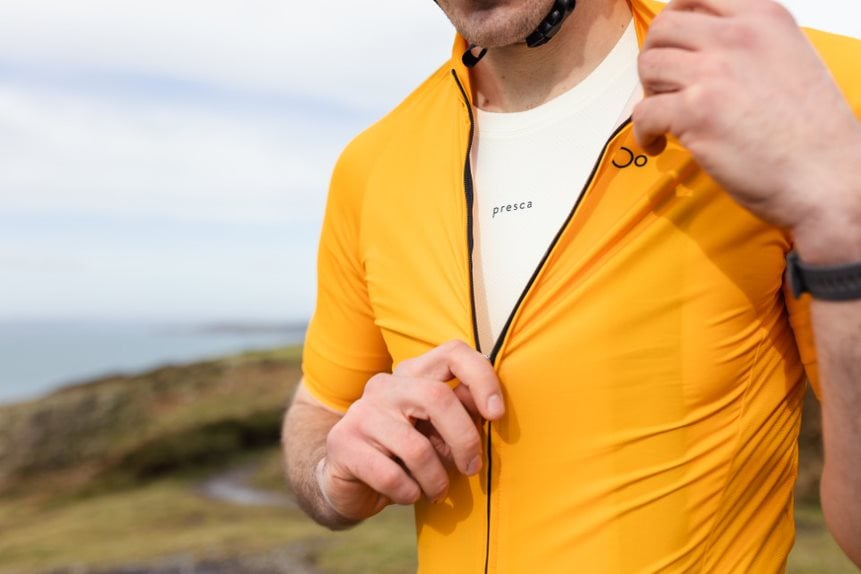
However, recycling is the last resort as far as we’re concerned. So right now, most of our energy is being invested in keeping clothing in use for as long as possible.
Whether through our re-commerce program, which is a great way to offer high-quality sportswear at a lower price point, or through our repair offering, which we are currently expanding.
Do you have a favourite Presca product you can’t live without?
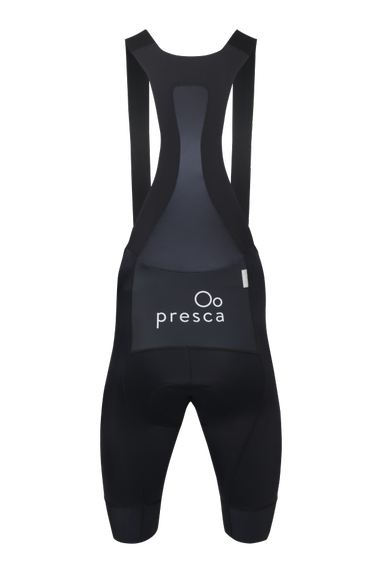
I’m a huge fan of our bib shorts. For those non-cyclists out there, bib shorts are lycra shorts with a padded seat to keep you comfortable on your bike.
I used to just use my bib shorts for long road rides but increasingly, I’m using them for road and mountain bike rides, spinning, and even commuting into the office – they’re so damn comfortable!
The really cool thing is we recently launched the first service in the UK to replace the pad from those shorts when it’s worn out so we can keep them in use and comfortable for as long as possible without needing to replace them.
Have you recently tried a product from another responsible brand that you can recommend to our readers?

I am a huge fan of Hiut denim. They are a small jeans brand based in West Wales; they make all of their clothing in Cardigan, and it’s brilliant quality.
The jeans aren’t cheap, but they come with a lifetime guarantee, and you can send them back time and again to be repaired. I think my current pair are on their third set of repairs and still going strong.
Can you share any tips on how we can be more responsible as consumers?
We regularly share information with our consumers through our newsletter about how to treat and care for your sportswear as well as possible. But we always come back to the key principle of buy once buy well and then look after it.
The most sustainable piece of sportswear is the one that was never made; if you own fewer, higher-quality things and keep them in use for as long as possible, then you will be significantly reducing your impact.
The most sustainable piece of sportswear is the one that was never made” if you own fewer, higher-quality things and keep them in use for as long as possible, then you will be significantly reducing your impact.
How do you see the ‘sustainable sportswear’ industry evolving over the next few years?
There are a lot of startups in the “sustainable” sports apparel and shoe space.
The market is very crowded, which means it’s likely to see a recalibration at some point, and many of those companies won’t make it. But, for those that do, I would love to see some of them/us taking a big enough market share to drive genuine change in the wider industry. We’re already seeing the bigger brands such as Nike and Adidas partnering with smaller, nimble sustainable-focused brands because the big guys don’t have the ability to do this themselves within the same kind of timeframes the smaller companies can.
What are the next steps for your brand?
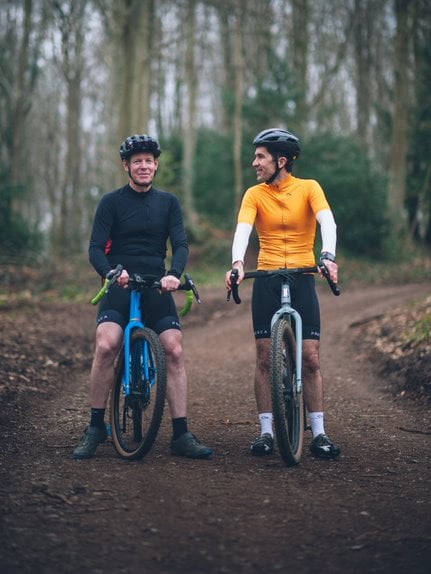
We are currently developing our product offering to cover all the sports that our community participates in, so there’s a lot of work to do there.
Our approach is to develop an evergreen product range that we will improve to the next most sustainable offering through iterations instead of numerous seasons and numerous product launches each year.
In terms of where we go with the impact of the brand for me, this is really about adopting fibres and fabrics that can make a genuinely positive impact – for example, fabrics derived from regenerative agriculture or bio synthetics that actively lock up carbon in their manufacture.
We still have a way to go until we can say we’re making a genuinely positive impact, but that is the ambition.
Do you have any tips for dealing with the stresses associated with growing the company?
Coldwater. I’m really appreciating the health benefits of stressing the body every day and being outside my comfort zone by waking up with a cold shower and swimming in cold water whenever possible. I can’t recommend it enough. It’s great for mindfulness, and I am certain that my stress levels are reduced as a result.
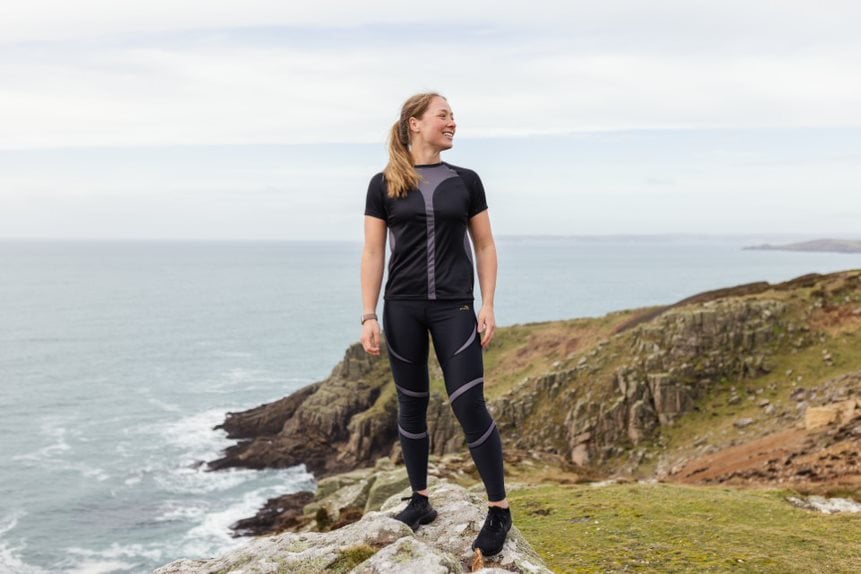
How do you ensure Presca stays true to your mission as you grow?
People, people, people. We’re nothing without the team, so we need to invest in them to ensure the culture that we develop speaks for itself.
Everyone always uses the example of Patagonia when talking about sustainable clothing, and for good reason – one of the things they do brilliantly well is culture. They’re a billion-dollar company, but every person in their global team knows exactly what the company is about and is very oriented towards that mission.
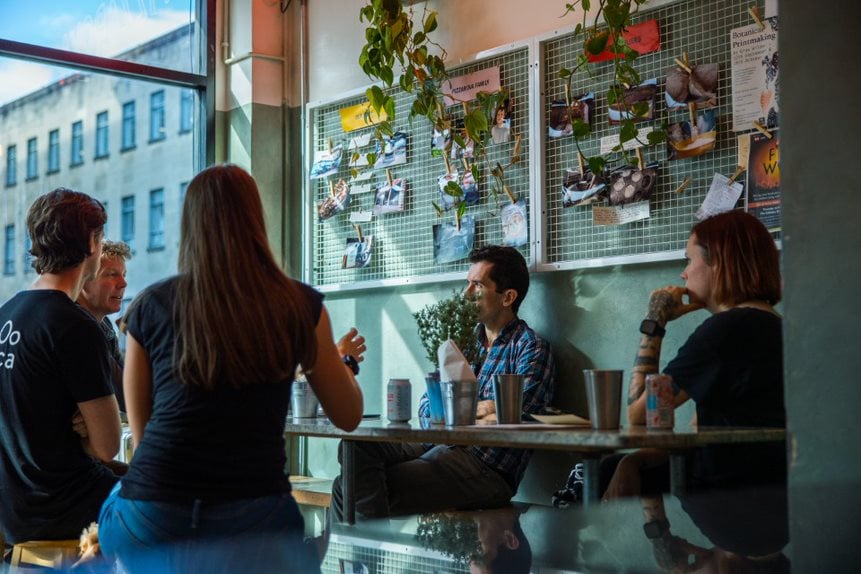
Do you suffer from eco-anxiety? And how do you combat it?
I’m not ashamed to say that at times I’ve really struggled with eco-anxiety and have been brought to tears on more than one occasion. I am extremely worried about what the planet will look like by the time my two young daughters have grown up.
However, I can’t do anything if I’m sitting wringing my hands, and the best antidote to hopelessness is action, whether that is simply picking up a few pieces of litter in the local park, going on a climate march, or using my voice to spread the message about how we can all be better for the environment.
I’m sure there’s so much more I can do, but the simple act of doing helps a lot.
Wrapping Up: Presca Sportswear Q&A
We want to give a big thanks to Rob for taking time to chat with us about Presca sportswear!
The UK-based brand is creating a fantastic range of ethically created cycling and running gear from responsible materials, we recommend you definately check them out!
If you enjoyed this article, you might also enjoy reading a round up of our favorite running shoes and activewear, or check out the rest of our Q&A series including an interview with sustainable swimwear brand Kitty & Vibe.



